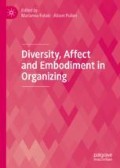Abstract
This chapter explores affective resonances between bodies and direct theoretical and analytical attention to their political and ethical potential. Thereby, the chapter problematizes the concept central in much management literature of a confined, rational individual as the centre of decision-making. The chapter draws on concepts of affect, and feminist writing on vulnerability and corporeal generosity to analyse a conversation at a seminar for educational managers in Denmark. Pors shows how an initial emotional outburst from one manager sat in motion an embodied and affective sharing of concerns through which the managers came to oppose the political pressures they are enmeshed in. The chapter offers new possibilities for thinking about organizational ethics by attending to affective and trans-subjective ways of thinking and feeling in organizations.
Access this chapter
Tax calculation will be finalised at checkout
Purchases are for personal use only
References
Ahonen, Pasi, Janne Tienari, Susan Meriläinen, and Alison Pullen. 2014. Hidden contexts and invisible power relations: A Foucauldian reading of diversity research. Human Relations 67 (3): 263–286.
Alvesson, Mats, and Kaj Sköldberg. 2000. Reflexive methodology: New vistas for qualitative research. London: Sage.
Blackman, Lisa. 2001. Hearing voices: Embodiment and experience. London: Free Association Books.
———. 2008. Affect, relationality and the problem of personality. Theory, Culture and Society 25 (1): 23–47.
Blackmore, Jill. 2004. Restructuring educational leadership in changing contexts: A local/global account of restructuring in Australia. Journal of Educational Change 5 (3): 267–288.
Blackmore, Jill, and Judyth Sachs. 2012. Performing and reforming leaders: Gender, educational restructuring, and organizational change. Albany: Suny Press.
Brennan, Teresa. 2004. The transmission of affect. Ithaca: Cornell University Press.
Butler, J. 2009. Frames of war. New York: Verso.
Christiansen, Tanja J., and Sine N. Just. 2012. Regularities of diversity discourse: Address, categorization, and invitation. Journal of Management and Organization 18 (3): 398–411.
Costea, Bogdan, and Lucas Introna. 2006. Self and other in everyday existence: A mystery not a problem. In Organization and identity, ed. Alison Pullen and Steven Linstead, 55–76. London: Routledge.
Danish Ministry of Education. 2007. Improving School Leadership – En national baggrundsrapport. [Improving School Leadership – A national report.] Pluss Leadership A/S. Copenhagen: Ministry of Education.
Despret, Vinciane. 2004. Our emotional make-up: Ethnopsychology and selfhood. New York: Other Press.
Diprose, Rosalyn. 2002. Corporeal generosity. On giving with Nietzsche, Merleau-Ponty, and Levinas. Albany: State University of New York.
Elgaard, Jan E., Henrik Smit, Anne Marie Hagelskjær, and Jesper W. Frandsen. 2011. Human Resource Management – menneske og organisation. Copenhagen: Hans Reitzel.
Ettinger, Bracha L. 2010. (M) Other re-spect: Maternal subjectivity, the ready-made mother-monster and the ethics of respecting. Retrieved from http://www.mamsie.bbk.ac.uk/documents/ettinger.pdf
Fotaki, Marianna, Beverly D. Metcalfe, and Nancy Harding. 2014. Writing materiality into management and organization studies through and with Luce Irigaray. Human Relations 16 (10): 1239–1263.
Fotaki, Marianna, Kate Kenny, and Sheena J. Vachhani. 2017. Thinking critically about affect in organization studies: Why it matters. Organization 24 (1): 3–17.
Grear, Anna. 2007. Challenging corporate ‘humanity’: Legal disembodiment, embodiment and human rights. Human Rights Law Review 7 (3): 511–543.
Kenny, Kate, and Marianna Fotaki. 2015. From gendered organizations to compassionate borderspaces: Reading corporeal ethics with Bracha Ettinger. Organization 22 (2): 183–199.
Loacker, Bernadette, and Sara Louise Muhr. 2009. How can I become a responsible subject? Towards a practice-based ethics of responsiveness. Journal of Business Ethics 90 (2): 265–277.
OECD. 2008. Improving school leadership, education and training policy. Teaching and learning international survey. Conducted by Beatriz Pont, Deborah Nusche, and Hunter Moorman. Paris: OECD.
Philippopoulos-Mihalopoulos, Andreas. 2011. The sound of a breaking string: Critical environmental law and ontological vulnerability. Journal of Human Rights and the Environment 2 (1): 5–25.
———. 2013. Actors or spectators? Vulnerability and critical environmental law. Vulnerability and Critical Environmental Law. Oñati Socio-Legal Series 3 (5): 854–876.
———. 2015. Spatial justice: Body, lawscape, atmosphere. London: Routledge.
Pors, Justine G. 2011. Noisy management. A history of Danish school governing from 1970–2010. PhD. dissertation, Copenhagen Business School.
Pors, Justine G., and Helene G. Ratner. 2017. The emergence and workings of a process view in public education policy. International Journal of Management Concepts and Philosophy 10 (1): 16–31.
Pullen, Alison, and Carl Rhodes. 2014. Corporeal ethics and the politics of resistance in organizations. Organization 21: 782–796.
———. 2015. Ethics, embodiment and organizations. Organization 22 (2): 159–165.
Sellar, Sam, and Bob Lingard. 2014. The OECD and the expansion of PISA: New global modes of governance in education. British Educational Research Journal 40 (6): 917–936.
Staunæs, Dorthe, and Helle Bjerg. 2017. Governing the intermediary spaces. Reforming school and subjectivities through liminal motivational technologies. In Critical analyses of educational reform in an era of transnational governance, ed. Thomas S. Popekewitz, Elisabeth Hultquist, and Sverker Lindblad, 197–202. New York: Springer.
Wyn, Johanna, Malcolm J. Turnbull, and Lyndall Grimshaw. 2014. The experience of education: The impacts of high stakes testing on school students and their families. In A qualitative study: The Whitlam Institute. Sydney: University of Western Sydney.
Ybema, Sierk, Dvora Yanow, Harry Wels, and Frans H. Kamsteeg, eds. 2009. Organizational ethnography: Studying the complexity of everyday life. London: Sage.
Author information
Authors and Affiliations
Corresponding author
Editor information
Editors and Affiliations
Rights and permissions
Copyright information
© 2019 The Author(s)
About this chapter
Cite this chapter
Pors, J.G. (2019). The Political and Ethical Potential of Affective Resonance Between Bodies. In: Fotaki, M., Pullen, A. (eds) Diversity, Affect and Embodiment in Organizing. Palgrave Macmillan, Cham. https://doi.org/10.1007/978-3-319-98917-4_2
Download citation
DOI: https://doi.org/10.1007/978-3-319-98917-4_2
Published:
Publisher Name: Palgrave Macmillan, Cham
Print ISBN: 978-3-319-98916-7
Online ISBN: 978-3-319-98917-4
eBook Packages: Business and ManagementBusiness and Management (R0)

